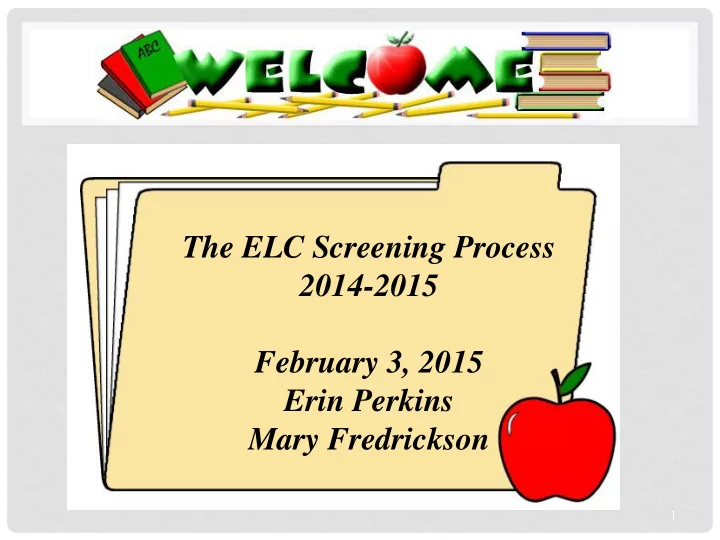

The ELC Screening Process 2014-2015 February 3, 2015 Erin Perkins Mary Fredrickson 1
The ELC program is…… A program for students who demonstrate • academic talent and high cognitive reasoning ability. An enrichment program designed to broaden • and deepen students’ academic experience . One day a week pull out program emphasizing • independent research skills, collaborative learning strategies and high levels of discourse. 2
Identifying students (Who) Students with the ability to….. • Process information quickly • Display persistence in an area of interest • Unusually well developed memory • Demonstrates outstanding level of aptitude defined as an exceptional ability to reason and learn • Documented performance or achievement in the top 10% or higher (Van Tassel-Baska) 3
Identifying students ( How ) NAGC believes that the process of identifying students for gifted and talented programs must be based on defensible measurement practices, including the process of selecting psychometrically sound assessments aligned with a program’s goals and objectives; the administration and interpretation of the assessments by individuals with appropriate credentials or training; and the ethical application of decisions regarding gifted program placement. (NAGC, The Role of Assessment in the Identification of Gifted Students) 4
Selecting Assessments NAGC believes that assessments selected for use in the identification of gifted students must be sensitive to and appropriate for the characteristics of the students being assessed and must aim to be inclusive of students from different cultures, races, and economic circumstances . 5
Selecting Assessments NAGC believes that because the use of assessments is an integral part of the identification process, test users have a responsibility to ensure that all testing is conducted in a fair and ethical manner . Such practices include the appropriate storing of testing materials before, during, and after testing; training all personnel involved with the administration and/or scoring of assessments; utilizing assessments that are developmentally appropriate and for only the purposes for which they were developed; interpreting assessment results to the appropriate audiences; and maintaining the confidentiality of students at all times. 6
Selecting Assessments Program Administrators are responsible for ensuring that... there is a process in place whereby the identification process is periodically evaluated to ensure that it is reflective of best practices in the identification of gifted students. 7
Step 1 • Top 20% of grade 4 students district wide, based upon a combined score on the MCAS English Language Arts and Mathematics Assessment, will be identified for Screening. 8
Advanced Achievement – English Language Arts MCAS Advanced On MCAS, a student at this level: Language/ demonstrates a comprehensive reading vocabulary and Vocabulary in-depth understanding of word parts and word relationships (e.g., prefixes, roots, suffixes, synonyms, antonyms) Comprehension demonstrates an in-depth understanding of concrete and abstract ideas and complex meanings in grade- appropriate texts connects complex ideas within texts and provides well- reasoned and well-supported arguments Text Elements and Techniques critically evaluates how structure and elements of genre support the author’s purpose or theme identifies and critically evaluates techniques authors use in a wide variety of texts (e.g., repetition, exaggeration, and figurative language) Composition writes well-organized, richly developed compositions with ideas that are clearly expressed and supported by extensive detail provokes and sustains the reader’s interest through effective and precise language, sentence structure, and vocabulary Writing Conventions writes compositions with sophisticated control of the standard English conventions of grammar, spelling, punctuation, and usage 9
Advanced Achievement – Mathematics MCAS Advanced On MCAS, a student at this level: Conceptual connects concepts from various areas of Understanding mathematics, and uses concepts to and develop generalizations Procedural performs complex calculations and Knowledge estimations selects the best representations for a given set of data and purpose Problem generates unique strategies and Solving procedures to solve non-routine problems Mathematical uses multiple reasoning methods to solve Reasoning complex problems justifies strategies and solutions Mathematical uses various forms of representation (e.g., Communication text, graphs, symbols) to justify solutions and solution strategies 10
Step 2 • Students identified for screening will be administered a Reasoning (Cognitive Ability) test in their home school. 11
Step 3 • Admissions decisions will be based upon both documented academic achievement (MCAS) and cognitive reasoning assessment results. 12
The steps in review Step 1: Students who document academic achievement in the top 20% of Grade 4 district-wide, based on a combined ELA and Mathematics MCAS score, are identified. Step 2: Students identified in Step 1 participate in a Reasoning (Cognitive Ability) test in their home school. Step 3: Students are admitted to the ELC Program based upon a review of documented academic achievement (MCAS) and cognitive reasoning ability. 13
ELC TIMELINE 14
Recommend
More recommend